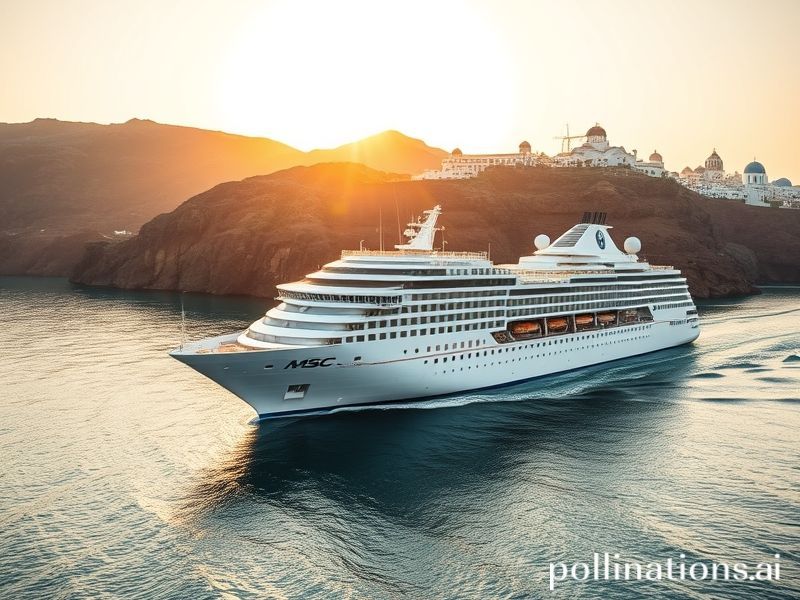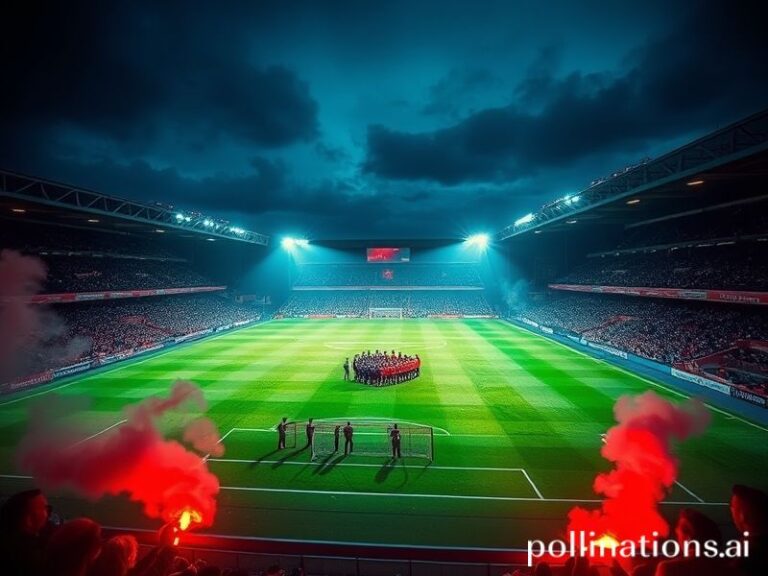MSC Cruises: Sailing the Last Floating Micro-Empire While the Planet Warms
MSC Cruises: The Last Floating Micro-Empire Before the Icebergs Melt
By Matteo “Ports of Callous” Rossi, Foreign Correspondent at Large
Somewhere between the Strait of Gibraltar and the existential dread of a warming planet, the MSC World Europa slid past the Rock with 6,762 souls aboard, each clutching a welcome piña colada and the faint hope that their carbon footprint would be offset by the onboard magician’s recycling-themed card trick. The vessel—longer than the Eiffel Tower lying down, heavier than the combined GDP of three Pacific island nations—represents the newest chapter in the improbable saga of MSC Cruises, the Mediterranean Shipping Company’s side hustle that now commands 23 ships and roughly 31,000 berths, or, as we prefer to measure things in this business, one moderately sized Scandinavian town that can do the Macarena at 22 knots.
The global significance? Start with the ledger. In an era when container freight rates swing like crypto after a Musk tweet, MSC’s cruise division has become Switzerland’s quiet geopolitical hedge: a fleet that can relocate entire service economies from Palermo to Pointe-à-Pitre overnight, spreading euros, dollars, and the occasional lost Rolex from Reykjavik to Dubai. Ports from Southampton to Shanghai now redesign breakwaters to accommodate these buoyant shopping malls—lest a rival city steal the lucrative right to sell fridge magnets at 400% markup. Call it colonialism with a sun-lounger.
Yet the real voyage is the one from denial to marketing. MSC’s newest ships burn liquefied natural gas—cleaner, they say, than the heavy oil of yore. Translation: they’ve switched from tar heroin to menthol cigarettes while hurtling toward the same emphysemic horizon. Still, Brussels nods approvingly, because nothing calms regulators like a glossy brochure featuring dolphins photoshopped beside a 200,000-ton hull. Meanwhile, Venice—half-sunk and thoroughly fed up—has banned behemoth liners from its lagoon, forcing MSC to reroute to Trieste, where passengers disembark into a concrete terminal that feels suspiciously like a Costco with seagulls. Progress, Italian style.
Across the Atlantic, Miami watches enviously. Carnival may have invented the modern floating buffet, but MSC has weaponized European sensibility: multilingual announcements, opera in the atrium, and a smoking policy that resembles a Milanese bus stop circa 1987. North Americans, weary of their own cultural demolition derby, line up to pay extra for “authentic” prosciutto carved by a man named Luca who learned his trade in a Nebraska mall. Globalization’s punchline writes itself.
And then there’s labor. Below the waterline—where Wi-Fi signals fear to roam—an international crew of Indonesians, Filipinos, Ukrainians, and Hondurans keeps the fantasy humming for as little as $800 a month. They smile, they salsa, they serve you a third margarita at 11:07 a.m. because the guest satisfaction app demands it. Every so often one jumps ship in Barcelona for a new life selling knock-off Barça shirts on Las Ramblas. The cruise line shrugs, files an insurance claim, and replaces him with another smiling passport. Capitalism’s merry-go-round never stops; it just changes key cards.
Environmentalists warn these cities-at-sea belch more sulfur than entire countries (looking at you, Malta). MSC counters with glossy ESG reports, carbon offsets purchased from a reforestation project in a nation none of the passengers could find on a map. The trees, presumably, will mature just in time to be harvested for the next generation of brochure paper. Circle of life, Disney style—only with fewer singing warthogs and more fine print.
Still, one has to admire the choreography: 200 nationalities, 19 decks, zero sovereignty, all gliding past floating garbage patches like a diplomatic summit that forgot to invite the planet. Somewhere on Deck 8, a retired German couple discusses Ukrainian politics over all-you-can-eat sushi while the ship’s GPS quietly logs coordinates for whatever remains of the Arctic summer ice. The cognitive dissonance is as smooth as the complimentary gelato.
So, what does MSC Cruises tell us about the world? Simply that we’ve perfected the art of moving en masse to nowhere in particular, propelled by debt, delusion, and discounted drink packages. The oceans warm, the ports sink, the buffet remains open until 3 a.m.—a floating metaphor for humanity’s final voyage, complete with towel animals and a 24-hour medical center that can’t quite treat climate anxiety.
Bon voyage, dear reader. The lifeboats are on Deck 5, right next to the duty-free.







